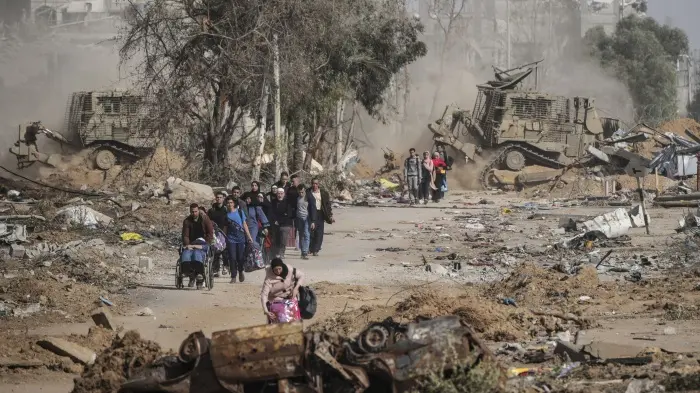In the heart of the Middle East, where ancient histories collide with modern geopolitics, Israel’s ground offensive in Gaza has ignited a firestorm of international debate and humanitarian concern. As of September 17, 2025, the Israeli Defense Forces (IDF) have launched a major ground assault on Gaza City, marking a significant escalation in the ongoing Israel-Gaza conflict. This operation, dubbed by some as a decisive push against Hamas strongholds, comes amid widespread global outcry, with accusations of genocide from United Nations commissions and urgent calls for ceasefires from world leaders. For those searching for updates on the Israel Gaza offensive 2025 or the Gaza ground invasion details, this comprehensive article delves into the roots, realities, and ramifications of this pivotal moment in the Israel-Palestine war.
The offensive, which began on September 16, 2025, involves armored divisions, infantry, and intense aerial bombardments, forcing hundreds of thousands of Palestinians to flee their homes. Reports indicate that Israel aims to dismantle Hamas’s remaining infrastructure in Gaza City, a move that has drawn sharp criticism for exacerbating the already dire humanitarian crisis in Gaza. With keywords like “Israel ground offensive Gaza escalation” and “global outcry Gaza conflict” dominating search trends, understanding this event requires a balanced look at historical context, current operations, and future implications. Stay informed as we explore how this escalation could reshape the region and beyond.

Background of the Israel-Gaza Conflict: From Roots to Recent Escalations
To grasp the full scope of Israel’s ground offensive in Gaza, one must trace the conflict’s deep-rooted history. The Israel-Palestine dispute dates back to the early 20th century, with the establishment of Israel in 1948 leading to the displacement of hundreds of thousands of Palestinians in what is known as the Nakba. Gaza, a densely populated strip along the Mediterranean, has been a flashpoint since Israel withdrew its settlers in 2005, only for Hamas to take control in 2007, prompting a blockade that has stifled economic growth and fueled tensions.
Fast-forward to October 7, 2023, when Hamas launched a surprise attack on Israel, killing over 1,200 people and taking hostages. Israel’s Ground retaliatory campaign, initially focused on aerial strikes and limited ground incursions, has since evolved into a prolonged war. By September 2025, the Gaza Health Ministry reports nearly 65,000 Palestinian deaths, predominantly civilians, amid allegations of disproportionate force. This backdrop sets the stage for the current Gaza ground invasion, where Israel seeks to prevent Hamas from regrouping in urban areas like Gaza City.
In recent months, ceasefires have been fragile at best. A two-month truce shattered in March 2025 with Israeli airstrikes, leading to renewed violence. The escalation in September 2025 follows intelligence reports of Hamas rebuilding capabilities, prompting Prime Minister Benjamin Netanyahu’s government to authorize a full-scale offensive. For more on the historical timeline, check our internal guide on the Israel-Palestine Conflict History at likiy.net.
Experts argue that economic desperation in Gaza, with unemployment rates soaring above 50%, has perpetuated cycles of violence. The blockade, enforced by Israel and Egypt, restricts goods and movement, creating a humanitarian powder keg. International bodies like the UN have repeatedly called for lifting restrictions, but geopolitical alliances—particularly Israel’s Ground strong ties with the US—have hindered progress.
As the conflict enters its third year, the human cost is staggering. Over 2 million Palestinians in Gaza face famine risks, with aid convoys often blocked or attacked. This historical context underscores why the current offensive is not just a military maneuver but a chapter in a decades-long struggle for land, security, and self-determination.
Details of Israel’s Ground Offensive in Gaza: Tactics, Timeline, and Targets
The ground offensive in Gaza City, launched on September 16, 2025, represents Israel’s Ground most ambitious urban assault since the war’s onset. IDF spokesperson announced the operation as an “expanded ground incursion” aimed at Hamas’s last remaining strongholds in the city. By September 17, tanks and infantry from two divisions had penetrated deep into Gaza City, with a third division expected to join.
Tactically, the offensive combines ground troops with aerial and artillery support. Israeli forces have struck over 150 targets, including residential areas, schools, and infrastructure, leading to reports of massive destruction. Defense Minister Israel Katz declared “Gaza is burning,” emphasizing the intensity of the assault. Evacuation orders were issued, with a 48-hour temporary route opened for civilians to flee south via Salah al-Din Street. However, residents report that bombardment follows them, turning “safe zones” into death traps.
The timeline is projected to last several months, with Israel vowing to occupy parts of Gaza City to root out militants. Satellite imagery shows armored vehicles encircling the city, and strikes have leveled high-rise buildings and mosques. Hamas has responded with rocket barrages, though diminished in scale compared to earlier phases.
This phase of the Israel Gaza offensive 2025 has already claimed dozens of lives, with over 30 Palestinians killed in the first day alone. For in-depth analysis on military strategies, visit our Middle East Military Conflicts section on likiy.net.
Critics point to the urban warfare’s inherent risks, where distinguishing combatants from civilians is challenging. The IDF claims precision targeting, but independent reports suggest otherwise, with entire neighborhoods reduced to rubble.
Humanitarian Impact: Crisis Deepens in Gaza Amid Offensive
The humanitarian fallout from Israel’s ground offensive in Gaza is catastrophic, amplifying an already dire situation. As of September 17, 2025, over 300,000 Palestinians have fled Gaza City, joining the ranks of the displaced in overcrowded southern areas. UNICEF has described the scene as “inhumane,” with children traumatized by relentless conflict.
Famine looms large, with parts of Gaza experiencing severe food shortages. Aid deliveries are hampered by the offensive, as convoys face attacks and blockades. The UN reports that 400 of its staff have been killed since the war began, underscoring the dangers for humanitarian workers.
Hospitals are overwhelmed, with strikes targeting medical facilities. An 11-year-old girl was rescued after 10 hours under rubble, highlighting the personal tragedies amid the chaos. The Gaza Health Ministry’s toll nears 65,000 deaths, including journalists, academics, and aid workers.
Environmental impacts are severe; rebuilding Gaza could exceed the annual emissions of 135 countries. For resources on aiding Gaza, link to external sites like UNRWA or our internal Gaza Humanitarian Aid Guide.
Women and children bear the brunt, with reports of increased gender-based violence and child exploitation in displacement camps. The offensive’s escalation threatens to push Gaza beyond the brink, with no end in sight.
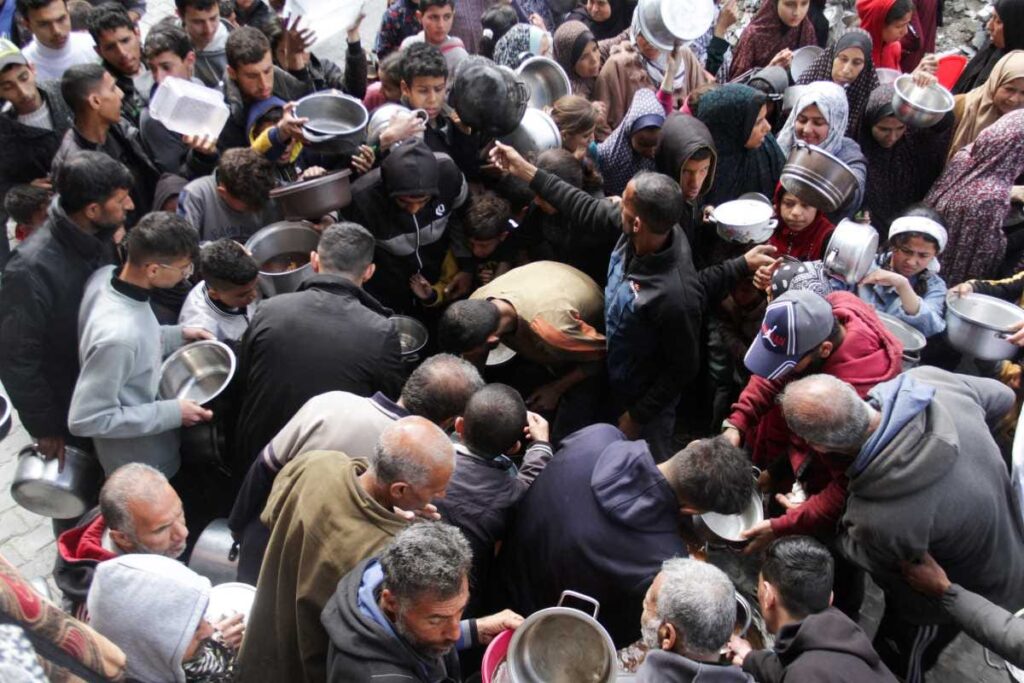
Global Outcry and Reactions: From Condemnation to Calls for Action
The international community has responded with vehement outcry to Israel’s ground offensive in Gaza. On September 16, 2025, a UN commission concluded that Israel is committing genocide, citing acts like systematic destruction and incitement by leaders like Netanyahu. UN Secretary-General António Guterres called the situation “morally, politically, and legally intolerable.”
European nations, including Luxembourg, are moving to recognize Palestine, adding pressure on Israel. The EU is preparing sanctions, while Arab and Muslim countries denounce the assault. Even allies like the US, through Secretary of State Marco Rubio, have warned of failing diplomacy while maintaining support.
Protests erupt worldwide, from Tel Aviv—where hostage families demand ceasefires—to global capitals. Human rights groups like B’Tselem label it genocide, urging accountability. For more on international responses, see our Global Politics News on likiy.net.
The outcry includes calls for ICC investigations, with the UN draft resolution highlighting threats to Middle East peace. This global backlash underscores the offensive’s isolation of Israel on the world stage.
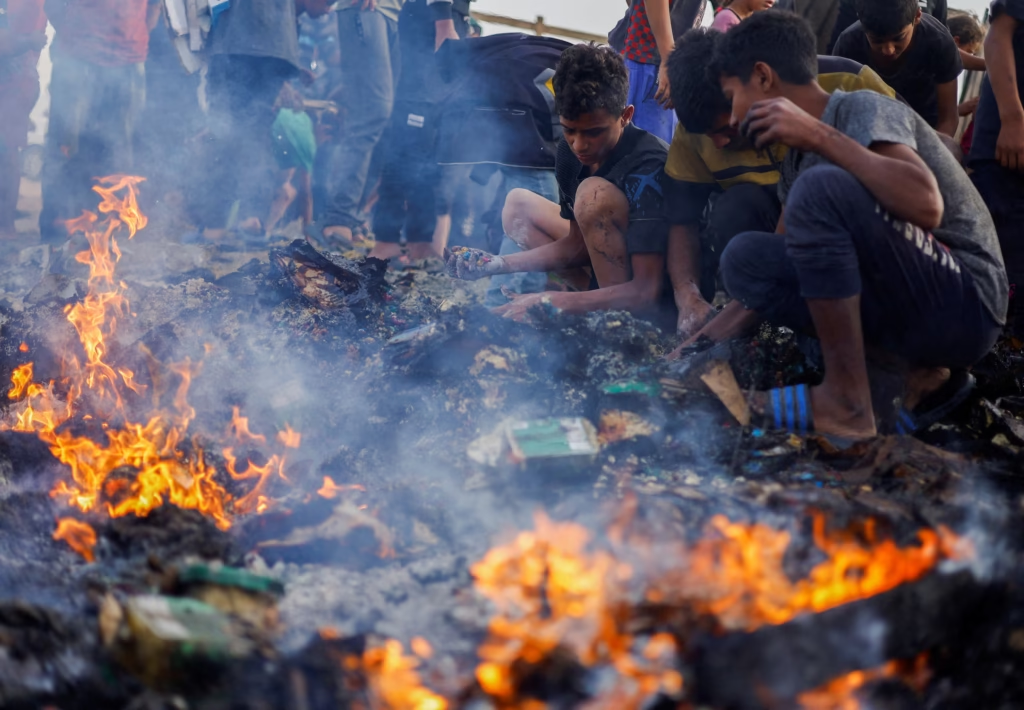
Israeli Perspective: Security Imperatives and Justifications
From Israel’s Ground viewpoint, the ground offensive in Gaza is a necessary response to existential threats. Officials argue that Hamas’s regrouping in Gaza City poses an imminent danger, justifying the incursion to secure borders and free hostages. Netanyahu’s government emphasizes that the operation is targeted, with evacuation warnings to minimize civilian harm.
Domestic support is mixed; weekly protests in Israel call for hostage deals, but many back the military’s resolve. The IDF highlights successes, like striking militant sites, as steps toward lasting peace.
Critics within Israel, including rights groups, decry the human cost, but the narrative frames the offensive as defensive warfare. For Israeli news sources, link to Haaretz.
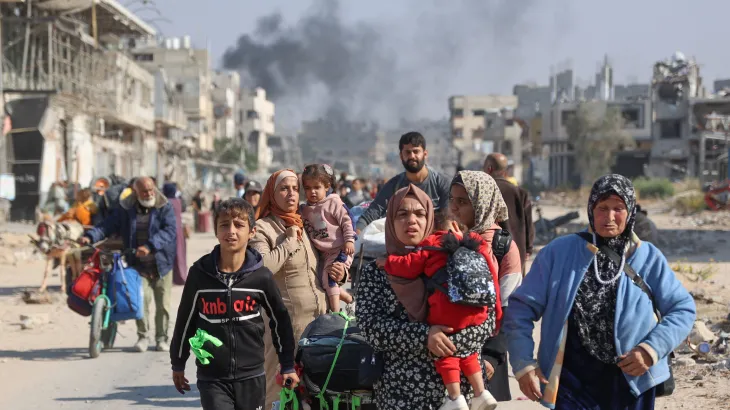
Palestinian Perspective: Survival Amid Devastation
Palestinians view the offensive as an extension of occupation and ethnic cleansing. Residents describe “hell” under bombardment, with families fleeing in panic. Hamas calls it a “genocide,” urging international intervention.
Stories of resilience emerge, like rescues from rubble, but the toll is immense. Calls for sumud (steadfastness) persist amid destruction. External links to Al Jazeera Palestine Coverage.
Potential Outcomes: Pathways to Peace or Prolonged Conflict?
The offensive could lead to Hamas’s defeat or further radicalization. Ceasefire talks, mediated by Qatar and the US, hang in the balance. Outcomes may include occupation, international peacekeeping, or renewed negotiations.
Global pressure could force de-escalation, but without addressing root causes, peace remains elusive. Explore our Peace Initiatives in Middle East.
A Call for Reflection and Action: Israel’s Ground Offensive in Gaza Amid Escalation and Global Outcry
As the dust settles—or rather, continues to rise—from Israel’s ground offensive in Gaza, launched on September 16, 2025, the world stands at a crossroads. This operation, which has seen Israeli forces push deep into Gaza City with armored divisions and relentless airstrikes, has not only escalated the nearly two-year-long conflict but has also amplified global calls for immediate reflection and decisive action. For those seeking in-depth insights into the Gaza conflict escalation 2025, Israel’s Gaza City invasion details, or international responses to Gaza humanitarian crisis, this expanded exploration delves into the multifaceted demands for peace, accountability, and humanitarian intervention. Drawing from recent developments, we examine how this offensive underscores the urgent need for global leaders, institutions, and individuals to reflect on the cycle of violence and take concrete steps toward resolution.
The phrase “A Call for Reflection and Action” encapsulates the growing chorus from international bodies, human rights organizations, world leaders, and grassroots movements. It is a plea born out of horror at the mounting death toll—now approaching 65,000 Palestinians since October 2023, according to Gaza’s Health Ministry—and the systematic destruction that has rendered much of Gaza uninhabitable. As Israeli Defense Minister Israel Katz starkly declared, “Gaza is burning,” the offensive has drawn sharp rebukes, with a United Nations commission concluding on September 16, 2025, that Israel is committing genocide in Gaza through acts of killing, causing serious harm, and imposing conditions calculated to bring about physical destruction. This finding, coupled with the ground incursion, has ignited a firestorm of diplomatic and public outcry, prompting reflections on moral, legal, and political failures.
The Imperative for Reflection: Historical Lessons and Moral Reckoning
Reflection begins with acknowledging the historical context that has led to this moment. The Israel-Palestine conflict, rooted in the 1948 Nakba and exacerbated by decades of occupation, blockades, and intermittent wars, demands a honest appraisal of how past actions have perpetuated suffering. The current offensive in Gaza City, home to over a million people before the war, is seen by many as a continuation of policies that prioritize military dominance over diplomatic solutions. UN Secretary-General António Guterres has described the situation as “morally, politically, and legally intolerable,” urging a collective reflection on how the international community has allowed the conflict to fester.
Human rights experts call for introspection on the disproportionate impact on civilians. Reports indicate that since the offensive began, over 30 Palestinians have been killed in a single day, with entire neighborhoods leveled and rescue efforts hampered by ongoing bombardments. Stories of personal tragedy abound: an 11-year-old girl rescued after 10 hours under rubble, families fleeing with nothing but the clothes on their backs, and hospitals overwhelmed amid strikes on medical facilities. These incidents force a reflection on the ethics of urban warfare in densely populated areas, where distinguishing combatants from non-combatants becomes nearly impossible.
Moreover, environmental and long-term societal reflections are crucial. The destruction in Gaza could generate emissions equivalent to the annual output of 135 countries, exacerbating climate vulnerabilities in an already arid region. Economically, Gaza’s unemployment rate exceeds 50%, and the blockade has stifled any hope of recovery. Reflecting on these factors reveals how the conflict not only claims lives but erodes the fabric of society, breeding further extremism. For a deeper historical analysis, explore our internal resource on Nakba and Its Legacy at likiy.net.
Global leaders are also prompted to reflect on their roles. The United States, Israel’s Ground primary ally, has provided unwavering support, yet even within the U.S., voices like Secretary of State Marco Rubio warn of the diplomatic fallout. European nations, such as Luxembourg, are moving toward recognizing Palestine, signaling a shift in reflection on colonial legacies and human rights commitments. This introspection is vital to breaking the cycle of violence that has claimed thousands of lives on both sides.
Urgent Calls for Action: Diplomatic, Humanitarian, and Legal Measures
Action must follow reflection if there is to be any hope for de-escalation. The global outcry has manifested in concrete demands across multiple fronts. Diplomatically, there are renewed pushes for ceasefires and negotiations. Qatar and the U.S. have mediated talks, but the offensive’s timing—coinciding with the UN genocide report—has complicated efforts. Arab and Muslim countries, including Saudi Arabia, have condemned the assault as “occupation and aggression,” calling for an immediate halt to hostilities. The European Union is preparing sanctions against Israeli entities involved in settler violence, while the UN Security Council debates a draft resolution highlighting threats to regional peace.
Humanitarian action is paramount amid the crisis. Over 300,000 Palestinians have fled Gaza City since the offensive began, exacerbating famine risks and displacement. Organizations like UNICEF decry the “inhumane” conditions, with children bearing the brunt of trauma. Calls for unrestricted aid access are urgent; convoys have been blocked or attacked, and the UN reports 400 staff killed since the war’s start. International aid groups urge the opening of more border crossings and the establishment of safe zones that are truly protected. For ways to contribute, visit external resources like UNRWA’s Gaza Aid Portal or our Humanitarian Action Guide on likiy.net.
Legally, the push for accountability is gaining momentum. The International Criminal Court (ICC) faces calls to investigate war crimes, with the UN commission’s genocide finding providing evidentiary weight. Human rights groups like B’Tselem and Amnesty International advocate for arms embargoes on Israel, arguing that continued military support enables violations of international law. Protests worldwide—from Tel Aviv, where hostage families demand deals, to global capitals—amplify these calls, pressuring governments to act.
Grassroots actions are equally critical. Social media campaigns, boycotts, and educational initiatives encourage individual reflection and collective pressure. Posts on platforms like X highlight the human stories, urging users to advocate for peace. For instance, calls for “sumud” (steadfastness) among Palestinians inspire global solidarity movements.
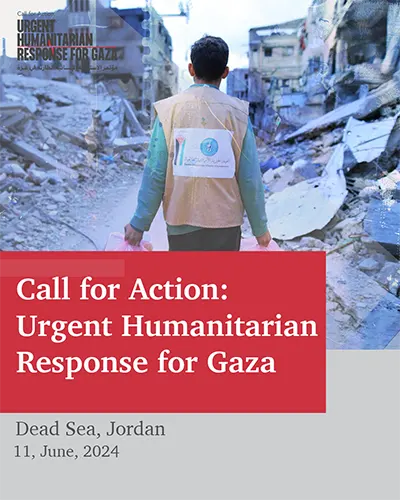
Potential Pathways Forward: From Reflection to Sustainable Peace
Envisioning action requires outlining pathways. Short-term: an immediate ceasefire to allow aid and negotiations. Medium-term: lifting the Gaza blockade and addressing settlement expansions in the West Bank. Long-term: a two-state solution or alternative frameworks that ensure security and self-determination for both Israelis and Palestinians. International peacekeeping forces could stabilize the region, while truth and reconciliation processes foster reflection on shared traumas.
However, without genuine commitment, the offensive risks prolonging the conflict, radicalizing new generations, and destabilizing the Middle East. The environmental cost alone—rebuilding Gaza’s infrastructure—demands global investment in sustainable recovery.
Heeding the Call
In the face of Israel’s ground offensive in Gaza, the call for reflection and action is not abstract—it’s a moral imperative. As the world witnesses “Gaza burning,” we must reflect on our complicity through inaction and commit to diplomatic, humanitarian, and legal steps that prioritize human life. This escalation amid global outcry serves as a stark reminder: peace requires courage, empathy, and unwavering resolve. For ongoing coverage on the Israel Gaza conflict 2025 and ways to get involved, subscribe to likiy.net and explore our Middle East Peace Initiatives.

